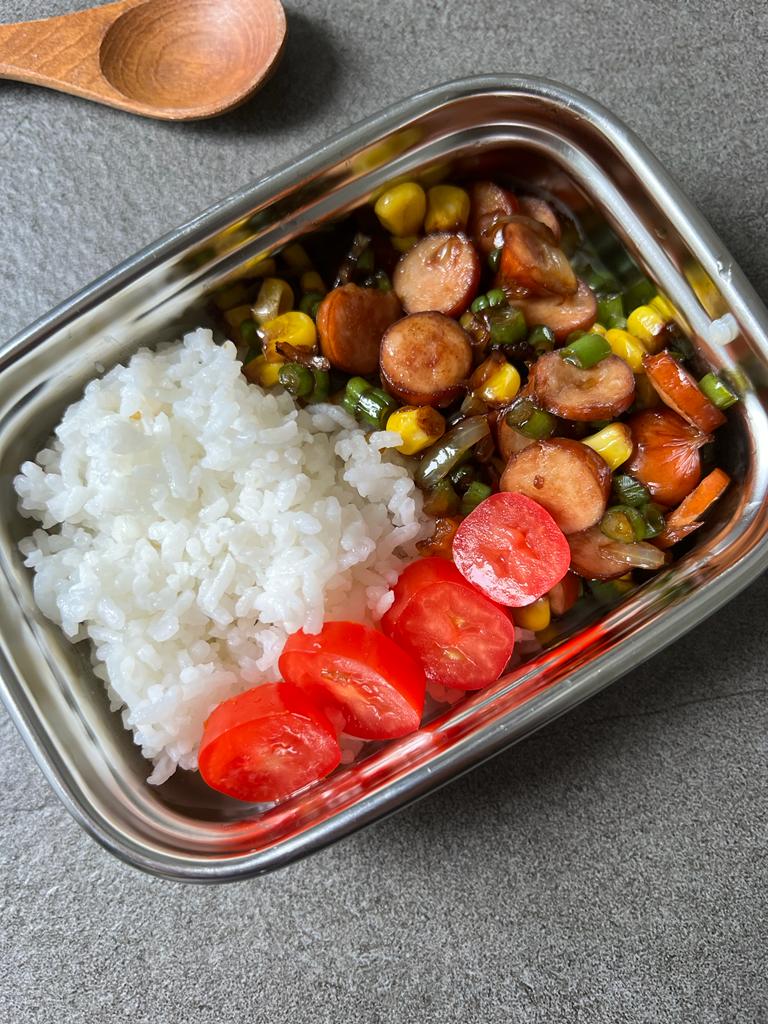'We can never be complacent': Parents of children with allergies battle anxiety, low awareness

Ms Amanda Chan's son Corey (third from left) has severe allergies to egg, dairy and peanuts. (Photo: Amanda Chan)
SINGAPORE: The day she had to administer an EpiPen to her five-year-old daughter is seared into Ms Candice Huang’s memory.
In December last year, Ms Huang allowed her daughter to eat some chocolate that was given out at a mall. She checked that the ingredients on the label did not include cow’s milk or eggs, which the girl is severely allergic to.
She warned her daughter to take a little first, as was usual with new foods, but the girl “wolfed down” a large chunk. Then she began complaining of pain.
“She started crying and vomiting and her eyes became bloodshot and she had so many dots around her eyes, which looked like burst blood vessels. She was crying and screaming and clenching and clawing at her throat.”
Ms Huang gave her antihistamines first, as is usual for an allergic reaction. But it did not work because her daughter was "vomiting nonstop". She started spitting out streaks of blood, which is when Ms Huang rushed to get an EpiPen. The auto-injector contains adrenaline that is used to treat someone who has a life-threatening allergic reaction.
Her daughter regained her composure 30 seconds after the EpiPen was administered, but the experience was “so scary”, Ms Huang said.
Although it was a lesson learnt the hard way, she said it has helped her whole family, including her daughter, to understand the consequences of a severe allergic reaction.
“After they witnessed the EpiPen episode, I feel like my whole household is very vigilant now,” she told CNA.
Her daughter is also more careful with chocolates now, and takes a small bite and waits for five minutes before taking another bite.
While the incident was caused by incorrect labelling, Ms Huang said she has to bear some of the responsibility.
“An allergy parent can never be too overly cautious and we can never be complacent for a second,” she said.
LOW AWARENESS OF SEVERE ALLERGIES
Parents CNA spoke to said that there is generally low awareness of severe allergies and how bad reactions can be.
“Unless you have personally witnessed a severe allergic reaction, you would never imagine it to be like that,” Ms Huang said.
She added that people tend to make light of the potential consequences, mostly due to ignorance.
She recounted an incident when she wanted to buy some cookies, but realised they contained ingredients her daughter was allergic to. But the woman selling the cookies simply said: “Aiyah, a little bit sure can one lah.”
“I cannot fault her or blame her for it because there’s simply just not enough awareness,” Ms Huang said.
The lack of awareness is common, said Ms Izlin Ismail, whose nine-year-old son is severely allergic to cow’s milk and eggs.
“Even the 'point point rice' or nasi padang I stay away, because it’s very difficult. The tongs that they use usually means cross-contamination, and some of them don’t get it – that there’s cross-contamination,” she said.
Even at restaurants, many do not know what allergens might be in the food they serve, said Ms Amanda Chan, who has a six-year-old son who is severely allergic to eggs, dairy and peanuts.
Sometimes, restaurants within the same chain may also give conflicting information, she added.
Singaporean Tan Wen Yang, whose five-year-old daughter had multiple severe allergies to foods like eggs, cow’s milk and nuts when he was living in Japan for 12 years, said things are different there.
Information on allergens was more readily available in Tokyo and Kanagawa, where he lived. The majority of popular or chain restaurants have a list that states the most common allergens used in their dishes, he said.
"It's easy to check before ordering and many of the family-friendly restaurants have an allergen-free menu item," he said. "In general, many waiters and waitresses will know about allergies and advise correctly."
What are severe allergies?
A severe or dangerous allergic reaction – or anaphylaxis – includes respiratory symptoms like coughing, wheezing, feeling of something stuck in the throat, change of voice and difficulty breathing.
It could also manifest in symptoms like fainting, looking pale, severe tummy pain and persistent vomiting, said National University Hospital's Dr Lydia Wong, who specialises in paediatric allergies.
Dr Mohana Rajakulendran, a paediatrician at Parkway East Hospital, said that anyone who has had a previous severe life-threatening allergic reaction needs to carry an EpiPen.
This includes people with multiple food allergies or with shellfish or peanut allergies, as they have a higher risk of more severe reactions, said Dr Mohana, who has a special interest in allergy and immunology.
About 1 per cent of her patients need to carry an EpiPen, she said.
“It acts on receptors on blood vessels and tissues to help improve circulation and blood pressure and reduce swelling during life-threatening reactions.”
Most food allergic reactions are mild to moderate in severity, but even when anaphylaxis occurs, most patients recover with no long-term complications if treated promptly and correctly, said Dr Chong Kok Wee, the head of allergy service at KK Women’s and Children’s Hospital.
“Death from food-related anaphylaxis is rare but can occur, and is usually preventable. Children with anaphylaxis should immediately be administered with an adrenaline auto-injector if available, or emergency medical services should be immediately activated,” said Dr Chong.
PREPARING FOR SCHOOL
It is not just restaurants' food parents have to be wary of, it’s food served in schools too. Preparing food for their school-going children and educating their teachers comes with the territory.
Ms Huang told CNA that her daughter's childcare centre customises meals for her to ensure they are allergen-free. But the centre is not able to provide suitable snacks, so her daughter brings her own snacks.
However, as her daughter grows up, some situations have become harder for her to accept.
“This year, she came home a few times and cried, asking: ‘Why my friends can eat all these and I can’t?’” Ms Huang said.
While she feels sad hearing this, Ms Huang said there is not much she can do. She provides a separate dessert for her daughter if she knows that there will be a celebration, but sometimes there is no advance notice.
She also goes the extra mile to ensure that her child’s teachers know how to help her in case of an allergic reaction. She conducts her own training once a year on how to administer an EpiPen.

Ms Izlin enrolled her son in a primary school that had a staff member who knew about allergies and how to administer an EpiPen.
She packs food for her son for his recess breaks, and her domestic worker goes to the school to pass him lunch as his after-school student care centre does not provide allergen-free food.
But despite the efforts, a sandwich containing dairy was accidentally given to him earlier this year.
The boy complained of stomach pain and was sent to the sickbay in school, where he remained for an hour before he called his mother and sounded like his throat was blocked. Her son wears a bracelet that indicates his allergies.
“I was thinking: ‘You are having an allergic reaction. Nobody is doing anything, what happened?’” she said.
Underneath the face mask he was wearing, he had broken out in hives, a symptom of his allergic reaction. It was Ms Izlin who eventually administered an EpiPen to him when she arrived at his school.
Hearing of such incidents makes Ms Chan, whose son will be entering Primary 1 in January, more anxious than she already is.
“It’s a huge leap from kindergarten where the teachers may be more attentive,” she said, adding that children in primary school are expected to be more independent.
Apart from being expected to order food at the canteen himself and look after his own belongings, Ms Chan’s son will have to take care of his own safety.
“He … needs to be very concerned about who’s eating what food around him and he’s got to be very careful that he isn’t exposing himself to his allergens unnecessarily,” she said.
“That part is incredibly difficult.”
ISSUES WITH SUPPLY OF EPIPENS, COST
The EpiPen can make a difference between life and death, but parents have had to deal with the sometimes unpredictable supply of the device, following global disruptions.
Among them is Ms Deborah Tan, who had to administer the EpiPen on her two-year-old daughter twice in three months this year.
After the second incident, when her daughter was hospitalised, Ms Tan was told by the hospital that they were out of EpiPen Jr for young children.
“That was really traumatising because after this second time, when she actually needed two EpiPens (to get her condition under control), we were going home without any in hand,” she said.
After calling other hospitals and retail pharmacies and realising that she could not get her hands on an EpiPen Jr, Ms Tan put up a “plea for help” on a Facebook group run by non-profit organisation Eczema and Allergy Support Foundation (SPEAK), asking if anyone could lend her one.
“A kind mother reached out to me and I got it from her that same day,” she said.
Cost is also an issue, said Ms Chan, who is SPEAK’s chairperson. Each EpiPen typically costs S$160, and those with severe allergies are usually expected to carry two, in case one fails. The cost is not subsidised and "adds up", she said.
Parkway East Hospital's Dr Mohana suggested that the Health Ministry look into sourcing for more brands of auto-injectors so that are more options available to patients and to minimise disruptions to supply.
She added that the cost of EpiPens should be subsidised.
“The price can be an important deterrent to many low- to middle-income families who do not purchase EpiPens due to the cost though medically advised to. EpiPens can save lives,” she said.
Parents said they hope that there is more awareness of allergies – especially severe ones – in school so they can rest assured that their children are safe.
“It comes to a point where I may not be able to send my allergic child to daycare as I don’t have childcare options to support my having a full-time job,” said Ms Huang.
“I hope there’ll be more awareness in schools, in the education sector so allergy kids can feel more included and their allergies can be professionally managed.”















